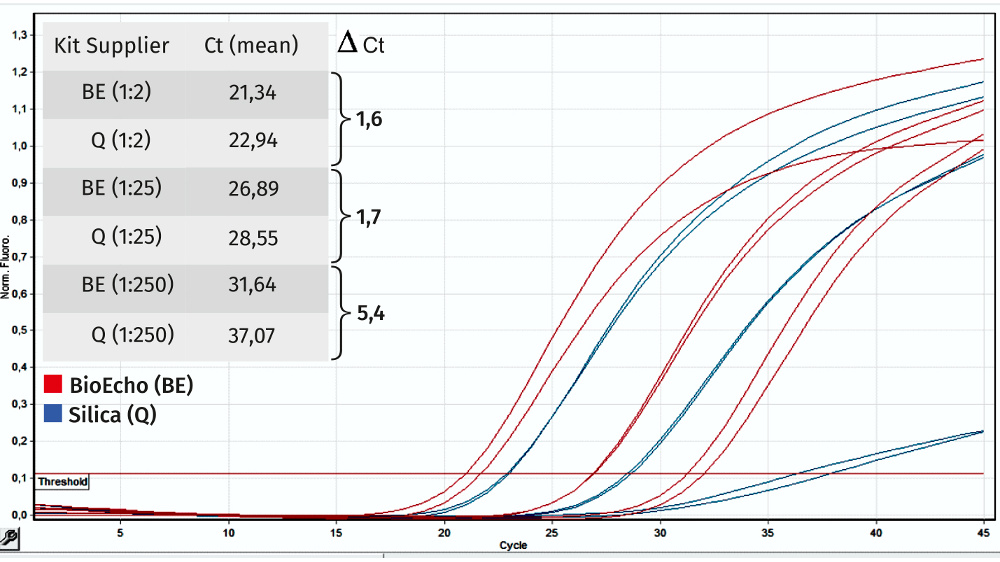
Inhibitor-free DNA for increased reliability in PCR analysis
BioEcho GmbH develops kits for the isolation and processing of DNA and RNA with a rapidly expanding portfolio. With expertise and passion, we overcome the limitations of common nucleic acid extraction with pioneering methods such as the proprietary Echolution single-step technology.
The products are significantly simpler to handle and faster than the widely used Silica-based bindwashelute extraction methods. The Echolution spin column principle works under native, aequeous conditions, therefore without denaturing salts and organic solvents such as ethanol – reagents that are required for bind wash – elute methods. Even in traces carried-over into the DNA fraction, they cause inhibition of enzymatic steps like PCR, resulting frequently in reduced sensitivity or even complete failure of the analyses.
Quick lysis of biological sample
Starting point of the Echolution technology is the lysis of cells or tissue under aequeous conditions at neutral pH and in the absence of denaturing salts. This process allows Bioecho to choose the best working enzymes like proteases or lipases for a complete and gentle lysis of the targeted sample type in a fraction of time. For the development of new kits, Bioecho’s comprehensive collection of more than 50 enzymes with various substrate specificities is screened and results in a tailor-made, sample-type specific selection, termed TurboLyseTM. In contrast to the Echolution technology, common bind-wash-elute procedures rely on a binding step to a Silica membrane in a denaturing environment at 7 M Guanidine Hydrochlorid (GuHCl). Since lysis needs to work under these harsh conditions, the Silica principle is restricted to only one single commercially available enzyme with its accordingly narrow substrate spectrum: Proteinase K. The Turbolyse enzymes with their broad and individually optimized substrate spectra, however, operate under Echolution´s native conditions in a pH neutral environment. This leads to a quick and complete lysis and a concurrent suppression of nucleolytic activities. Lysis for most tissue types (epithelial tissue, connective tissue, nervous and other fatty tissues) is complete after 15 minutes and fibrous samples after 30 minutes.
DNA purification in a single step
For separation of the target nucleic acid from the remaining cellular constituents and from process components (enzymes, co-factors, salts, detergents), the lysate is simply processed in a single centrifugation step. Bioecho’s purification matrix, is a proprietary formulated bead suspension and includes various functionalities and chromatographic principles. Depending on the sample type, the matrix – pre-filled in a spin column- is tuned to make sure that all sample- and process-derived components are retained. Free from inhibitors for enzymatic downstream analysis, the DNA is collected in the elution tube purified, desalted and buffered. DNA remains in solution during the entire process, also passing the chromatography matrix without interaction. Since no adsorption and desorption takes place, shearing forces are minimal and negative effects on DNA integrity are avoided.
High purity large fragment size sensitive PCR detection
The design of the Echolution purification matrix and the specialized process reagents, result in highly pure nucleic acid preparations. The absence of chaotrophic salts (Gu-HCl) and organic solvents (ethanol, iso-propanol) furthermore ensures that the purified DNA is free of inhibitors. By reduction to one centrifugation step for purification and by the avoidance of phase transformations, DNA with high average chain length (>30 kb) is obtained, which is advantageous for nanopore-based sequencing. Due to the maximal purity, detection reactions like the quantitative (real-time) PCR become significantly more sensitive and reliable compared to reactions using Silica-purified nucleic acids. The figure shows a typical qPCR result: DNA obtained using a Bioecho kit is detected by 1 to 5 cycles (Ct) earlier. This represents a clear improvement compared to the current state of the art. Even if the concentration of DNAis low, the Echolution system provides advantages: at least 50% of the PCR reaction volume can represent the undiluted nucleic acid fraction.
The Bioecho development team is positive that the Echolution technology is a valuable addition to available methods in molecular biology which will stand up to current approaches. An additional pro being the sustainability edge of the new process:
70% less plastic waste is generated than in comparable Silica methods, organic liquid waste is avoided completely and the packaging volume has been reduced significantly (www.bioecho.de).



 adobe.stock.com - ipopba
adobe.stock.com - ipopba BioDlink
BioDlink